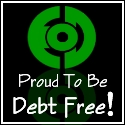
This article comes from the Money Girl's quick and dirty tips for a richer life. I really enjoy this site so I hope the information is helpful to those looking to gain financial freedom.
Why You Need to Budget
If you always have plenty of money to pay your bills on time, in addition to maintaining a healthy emergency fund, investing for your retirement, and saving for all your other goals, then you probably don’t need a spending strategy.
But if you’re struggling at all with your cash inflows and outflows, you need a simple spending strategy. That’s because it’s difficult to improve what you don’t measure. What you believe is going on can actually be very different from the reality of a situation. You may think the amount you spend on groceries or entertainment is reasonable, for example, but do you really know exactly how much that is, on average, each month? Until you dig a little deeper into your spending patterns, you won’t have all the information necessary to make good decisions and beneficial changes.
Create a Spending Strategy
I’m intentionally not telling you to “create a budget,” because if you’re like me, that mandate just sounds too stringent. A budget, for many, implies doing without and never being able to enjoy oneself. But a “spending strategy,” on the other hand, embraces the fact that you’re going to spend. It’s just a matter of making sure that you do it in a deliberate and smart way with your end goal in mind. The purpose of creating a spending strategy is to analyze where your money goes and to put you in control of your cash flow.
It’s All About Money Management
A spending strategy embraces the fact that you’re going to spend; it helps you spend smarter.
There’s a black hole that seems to suck up our money when we’re not looking. An essential element to eliminating debt and saving money to meet financial goals--like saving for a vacation or for retirement-- is to keep your money away from the black hole by improving your money management skills. That starts with doing a spending analysis to monitor all the many ways you pay bills, splurge, give to others, and possibly fritter away money.
I believe that a spending strategy should not make you miserable; otherwise, you’re apt to rebel against it. Its implementation should get you excited, because it’ll move you closer and closer to what’s truly important to you—living debt free and having money for what matters most. In fact, you may get so excited about reaching those goals that you’ll enjoy cutting out spending on the things that don’t matter to you. It can become a game for some people who really get fired-up about seeing their goals become a reality.
How to Create a Spending Strategy
I recommend that you enter the data for your spending strategy on a spreadsheet or in a financial program, but a piece of paper will work just fine too. The first task is to estimate your monthly after-tax income. For some this is easy because you receive a regular paycheck. For others who are paid on commission or who are self-employed, you’ll need to come up with a realistic monthly estimate.
Document Your Fixed Expenses
The second task is to enter all of your fixed monthly expenses below your income. Fixed expenses, such as rent, a mortgage, or home utilities, are those recurring costs that you must pay every month because they’re vital for your well-being or are commitments you’ve already made. Label each category or payment on a separate row. Don’t forget to account for any automatic payroll deductions that you may have for workplace insurance or savings to a retirement plan. Some fixed expenses you don’t actually pay for in equal amounts each month, so come up with a monthly average. For example, if you pay insurance just twice a year, calculate the annual amount you pay, and then divide by 12. Or if your utility bills fluctuate a lot, research the total you paid for a full 12 month period and divide by 12.
Estimate Your Variable Expenses
The third task is to enter all your variable monthly expenses below your fixed expenses. Variable expenses are those that can change each month or are discretionary. Dining out, buying clothes, groceries, a haircut, etc. could be some of your variable expense categories. Try to think of all the ways you spend money. Maybe going to the movies or to a local coffee shop are black holes for your money. If so, be sure to create separate categories just for them. Enter your actual expenses from at least three previous months by looking at charges in your checkbook register or bank statements. If you don’t have these, you’ll simply need to start tracking your expenses going forward.
When you subtract your monthly fixed and variable expenses from your monthly after-tax income, what you have left-over is called your discretionary income. It’s an important number because it’s what you have to pay down debt and build wealth for the future. The obvious goal is to make that number as big as possible. That can be accomplished by increasing your income or by decreasing your expenses, or by doing both.
For more tips visit Money girl quick and dirty tips







3 comments:
I never understand how people live without a budget. How does one know what they owe, how much and when it's due with a budget?
they live paycheck to paycheck, I use to do it and it was not pleasant.
I just need to be better about sticking to my budget. I always veer off it at some point.
Peace, Love and Chocolate
Tiffany
Post a Comment